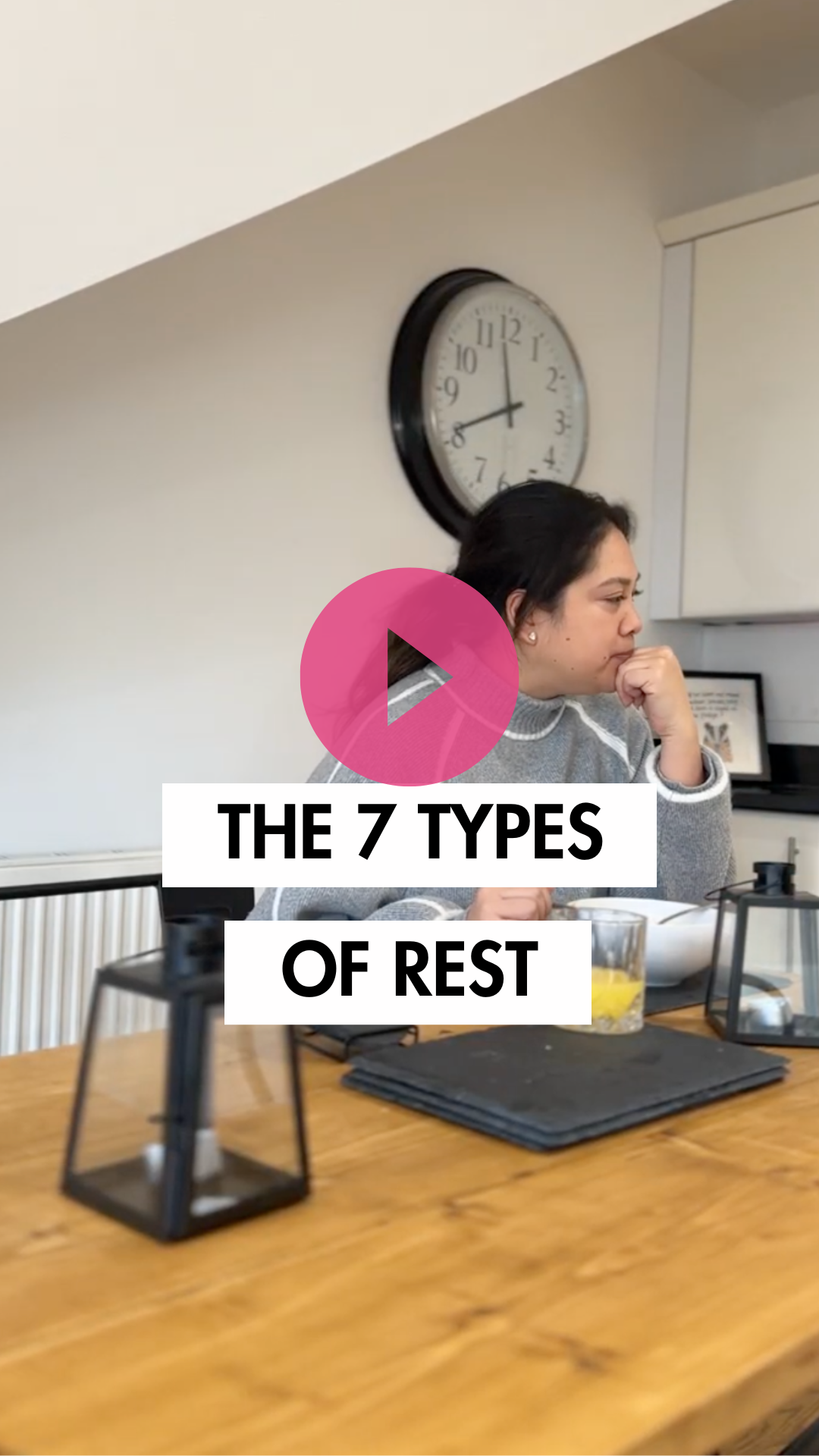The 7 Types of Rest You Actually Need(Because Sleep Isn’t Enough)
You ever get a full night’s sleep and still wake up exhausted? Like, how is that even possible? You went to bed at a reasonable hour, resisted the late-night TikTok rabbit hole, and yet…you’re still running on fumes.
Here’s the problem: Sleep and rest are not the same thing.
Most of us think that if we’re tired, the solution is simple: sleep more. But if that were true, why do we still feel drained even after hitting that eight-hour mark? Because there are actually seven different kinds of rest—and sleep only covers one of them.
So if you’ve been wondering why you still feel burned out even after a full night’s rest, it’s probably because you’re missing one (or more) of these.
Let’s break them down.
The 7 Types of Rest You Need
1. Physical Rest
This is the most obvious type of rest, and the one we tend to focus on the most. Physical rest includes both passive rest (sleeping, napping) and active rest (yoga, stretching, massage, deep breathing).
If your body constantly feels sore, tense, or exhausted—even when you’re getting enough sleep—you might need more active physical rest to help restore your body.
Try this: Prioritize movement that helps your body relax instead of just working it harder. A slow evening walk, deep stretches before bed, or even just lying down with your legs up the wall can do wonders.
2. Mental Rest
Ever lie down at night but your brain won’t shut up? That’s a sign you need more mental rest.
If your mind is constantly racing, you’re forgetful, or you feel like you can’t focus, your brain is probably overstimulated.
Try this: Set up a “brain dump” ritual—write down your thoughts before bed so they’re not swirling in your head. Also, take intentional breaks during the day instead of powering through (because staring at your phone between tasks is not actually rest).
3. Sensory Rest
We live in a world of constant stimulation—phones buzzing, emails piling up, screens in our faces 24/7. All of this can lead to sensory overload, making us feel irritable and exhausted without knowing why.
Try this: Give yourself quiet moments throughout the day—turn off notifications, lower the brightness on your screens, and spend a few minutes in complete silence. Your nervous system will thank you.
4. Creative Rest
Ever feel like you have zero creative energy left? Like you’re running on autopilot and nothing excites you anymore? That’s a sign you need creative rest.
Creative rest is about refilling your inspiration tank—and no, scrolling Pinterest doesn’t count.
Try this: Step away from the to-do list and spend time in beauty—listen to music, go to an art gallery, watch a sunset, or take a walk in nature. Let yourself be in awe of something without trying to produce or achieve anything.
5. Emotional Rest
If you feel like you’re constantly putting on a happy face, saying “yes” when you want to say “no,” or being the go-to emotional support for everyone else—you might need emotional rest.
Emotional rest is about honoring your own feelings instead of suppressing them to make others comfortable.
Try this: Check in with yourself—what do you actually need? Give yourself permission to express how you really feel. (And if you need a sign to set boundaries? This is it.)
6. Social Rest
We love our people, but not all social interactions are restful. Some relationships fill us up, while others drain us. If you’re feeling emotionally exhausted, it might be time to check in on who you’re spending time with.
Try this: Spend time with people who make you feel seen and energized—and take a step back from relationships that feel one-sided or emotionally taxing. (It’s okay to say no to plans. I promise.)
7. Spiritual Rest
This one isn’t just about religion—it’s about feeling connected to something bigger than yourself. If you’re feeling lost, disconnected, or like you’re just going through the motions, you might need more spiritual rest.
Try this: Whether it’s through prayer, meditation, journaling, or acts of service, take time to connect to what matters most to you. Even just pausing to breathe deeply and be present can be a form of spiritual rest.
What Type of Rest Do You Actually Need?
If you’re still tired after sleeping enough, take a second to ask yourself:
Is my brain overstimulated? (Mental rest)
Am I around draining people? (Social rest)
Have I been feeling uninspired? (Creative rest)
Do I need more quiet? (Sensory rest)
Am I carrying too much emotionally? (Emotional rest)
Do I feel disconnected from my purpose? (Spiritual rest)
Is my body physically exhausted? (Physical rest)
The good news? Once you figure out what type of rest you actually need, you can start prioritizing the kind of rest that truly restores you—not just more sleep.
Give Yourself Permission to Rest (Without the Guilt)
The world will keep spinning if you take a break. I promise.
So if you’ve been running on empty, consider this your permission slip to rest intentionally. Because when you finally start giving yourself the rest you actually need? You’ll be amazed at how much more energy, clarity, and joy you have.
Go ahead—take that break. You deserve it.
As a therapist, I wish more people knew that there are different types of tired…
Did you see my video on the topic of rest?


